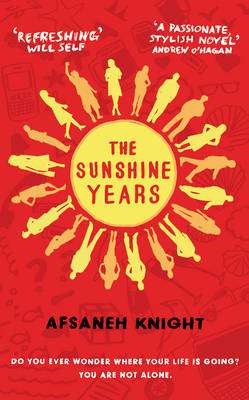You have no items in your cart. Want to get some nice things?
Go shopping ‘Do you ever wonder where your life is going? You are not alone,’ reads the logline on the front page of Afsaneh Knight’s second novel The Sunshine Years. Fresh from my own existential crisis, I hoped that I might find some words of comfort or support tucked away in Knight’s pages. I wasn’t disappointed.
‘Do you ever wonder where your life is going? You are not alone,’ reads the logline on the front page of Afsaneh Knight’s second novel The Sunshine Years. Fresh from my own existential crisis, I hoped that I might find some words of comfort or support tucked away in Knight’s pages. I wasn’t disappointed.
Delving into the intricate and intertwining twists and turns of the lives of a group of friends commencing the fourth decade of their lives, The Sunshine Years shows us the nitty-gritty realities of life that lie behind the familiar sunny and carefree portrayal of Sydney existence. Meet Story, Mac, JP, Cannie, Kali and Vincent as they struggle to come to terms with the shadowy side of thirty-something life, battling (among other things) career dissatisfaction, unspectacular relationships, lost loves, missed opportunities, loneliness and disillusionment.
The group’s history reaches back a long way, but we meet them as the invitations for Vincent’s wedding to Teresa land on their hearths; an event which acts to bind the gang together once more. Hardly a cause of excitement and revelry, the wedding day approaches against a backdrop of indifference and cynicism. Tuxedos are dug out from the backs of wardrobes and the merits of fascinators are considered, but these tasks are undertaken with a sense of monotonous weariness that saps the energy of the characters, the story and the reader. I’m sure that this is as Knight intended – she is trying to evoke the glitz and glamour of youthful optimism long passed, a time when real life has become more of a drag and a slog than a cause for celebration.
Story, the novel’s main protagonist, is struggling to cope with the fact that while his friends have started settling into domesticity and commitment like they’re hoping to gain a humungous tax break, he’s still trying to live the single life. One minute his life was great, focused on having a laugh down the pub with the boys, and then suddenly they all got serious. Story, though, feels like he’s gotten lost en route. While everyone else seems to have sorted out their lives, he’s still flailing around somewhere unremarkable, stranded on his own.
Cannie – so nicknamed because she is as boring as the Aussie capital – hovers in the background of both Knight’s story and her own life, while Kali is lost in a marriage devoid of sparkle, cut off from all those things that really matter and the ‘real’ Kali of days gone by. Kali used to be a swimmer, but one day it all just stopped – much like her life. A foray back into the sea reminds her of what she’s lost, and of the Kali she used to be. But can she apply this to the rest of her life?
Knight’s blunt, dry tone nicely encompasses the troughs in the lives of her characters. Although at times her style can feel a little distancing, it does its work, serving to characterise how remote everyone in the group feels from life, love and fulfilment. A touch of warmth and hope is shown in the character Oliver Marchal, the English solicitor who usurps JP’s position at his office. He takes over the partnership of the law firm where JP has stagnated, and the complex relationship of the two men plays out the contrast between hope and despair in microcosm.
The rather inconclusive ending of the novel left me with a sense of dissatisfaction, verging on discomfort. The group are left with little in their lives resolved. But the desire for meaning and answers to big questions is universal, and the uncertainty of Story and his friends taps into our own questions over where our lives are really going; there is paradoxical comfort in Knight’s lack of a conclusion. Knight’s demonstration of our inability to know and understand it all becomes an answer to one of life’s big questions in itself, and reading about others struggling with existential difficulties always serves as a comfort in times of uncertainty and confusion. But a note of optimism does belie the less-than-ideal prognosis of the cast. There’s just enough of a glimmer of sunshine to hope that somewhere, at some point, it might all start to become clearer for them. But it’s going to be a long and painful journey.
The Sunshine Years illustrates how life can pass us by without us realising. Although changing and moving on can be painful and heart-wrenching, it is also hopeful and sometimes necessary. That, together with the hope that the characters will take control of their lives and start living them to the full once more, took me back to the time when I had my own realisation that I was in the driving seat of my life, and it was down to me alone to convert my hopes into actions. Knight’s overarching theme will touch anyone who has ever questioned the meaning of their own existence and wondered if there could ever be anything more.
About Elizabeth Glanville
As well as writing for Litro I have contributed to a range of online and inprint papers and journals, and have recently self-published my debut novel, 'The Imaginist', which is available to buy at www.lulu.com and on amazon, and FREE to download across amazon sites all Easter weekend! Visit me online at www.elizabethglanville.com, on Facebook at Elizabeth Glanville, writer and follow me on Twitter @bethglanville




